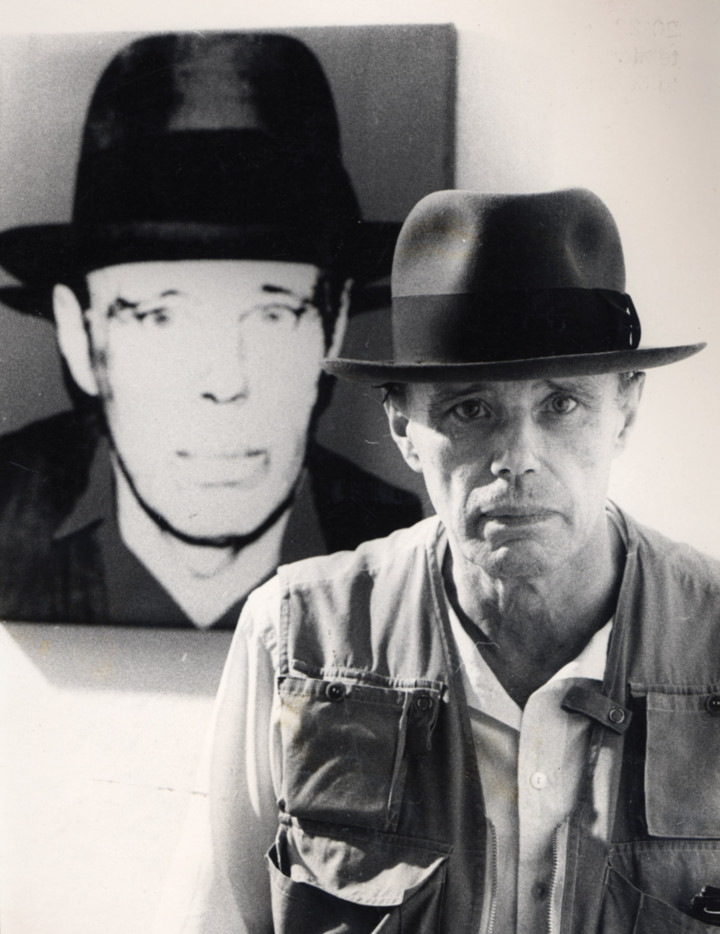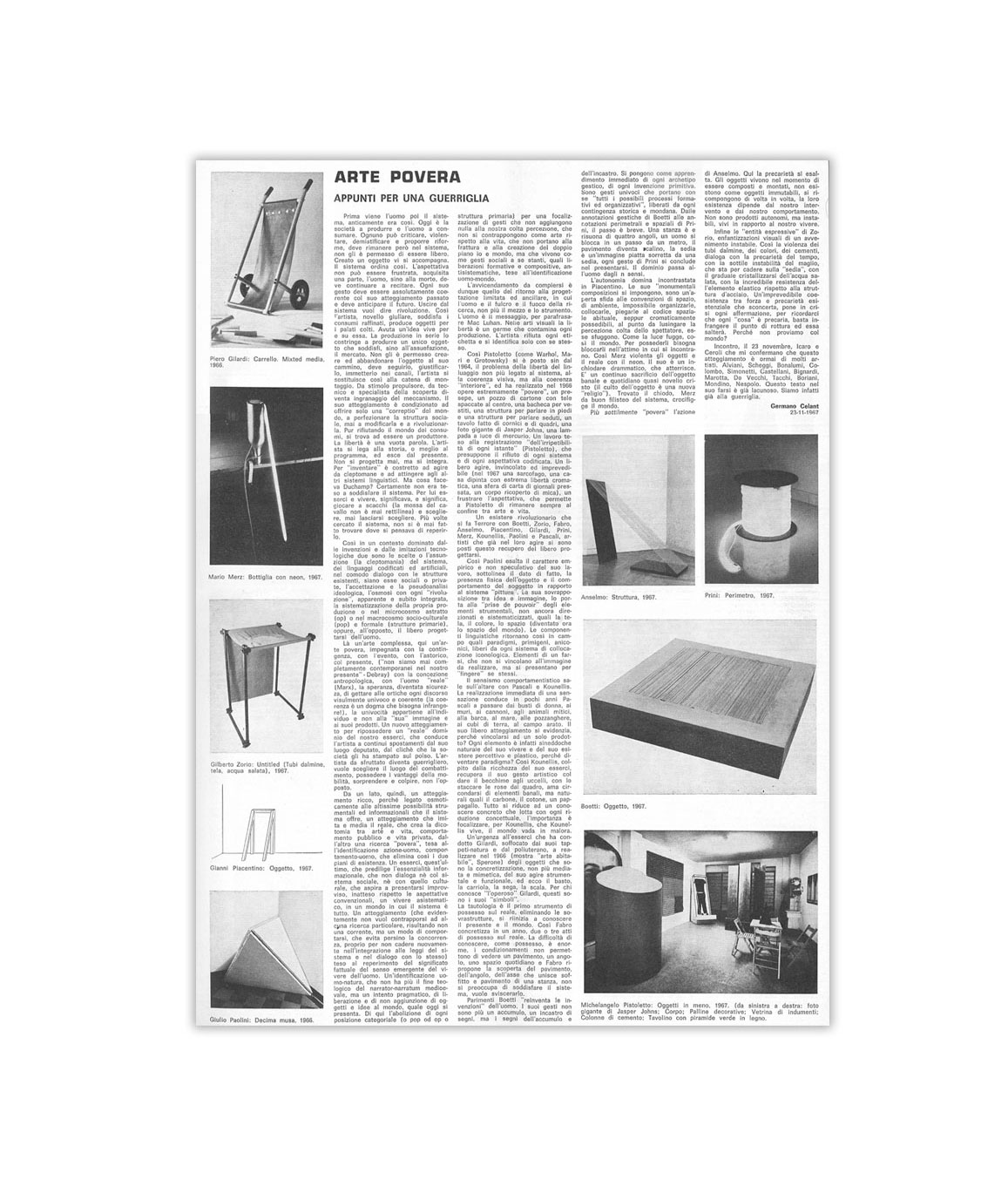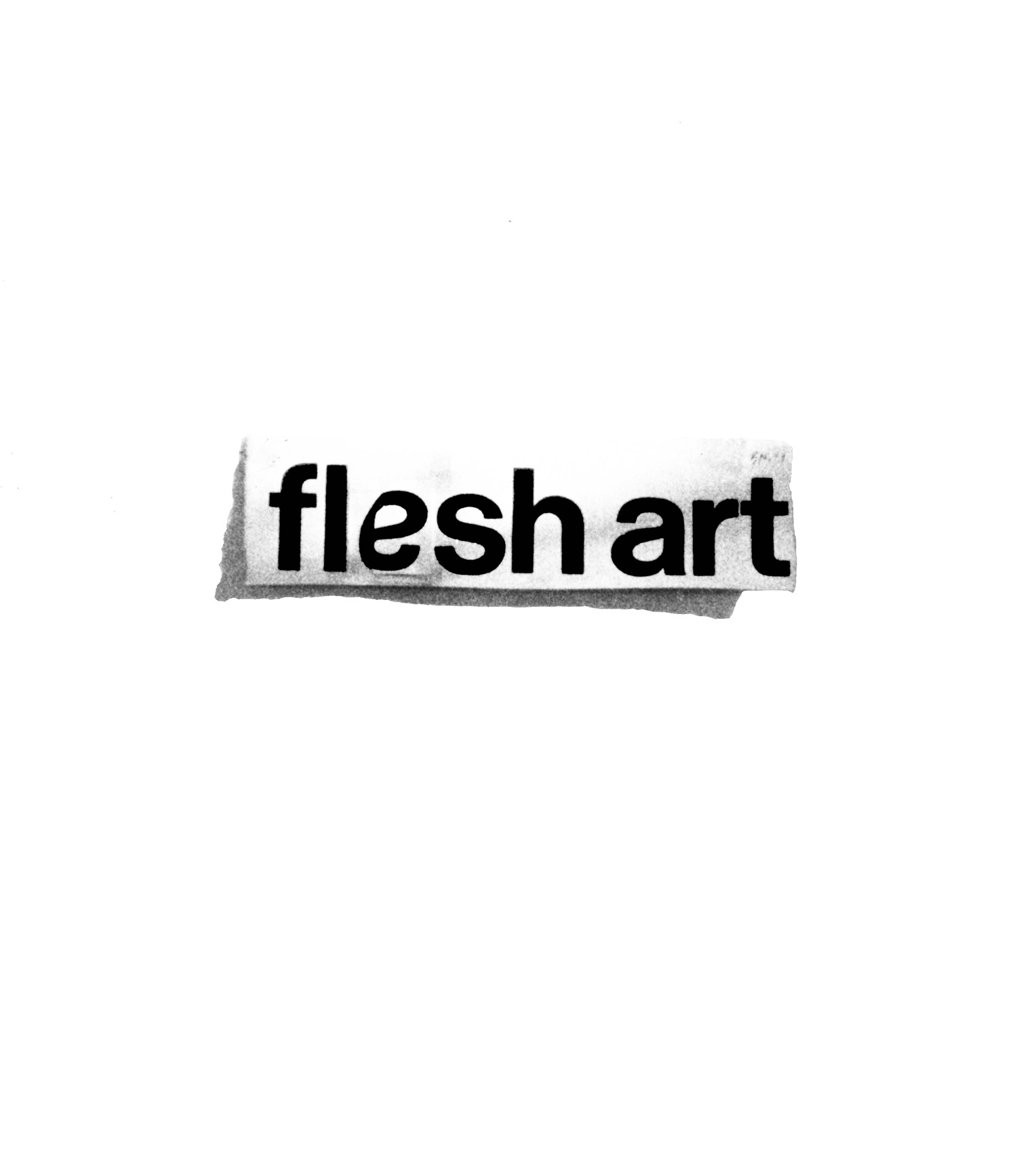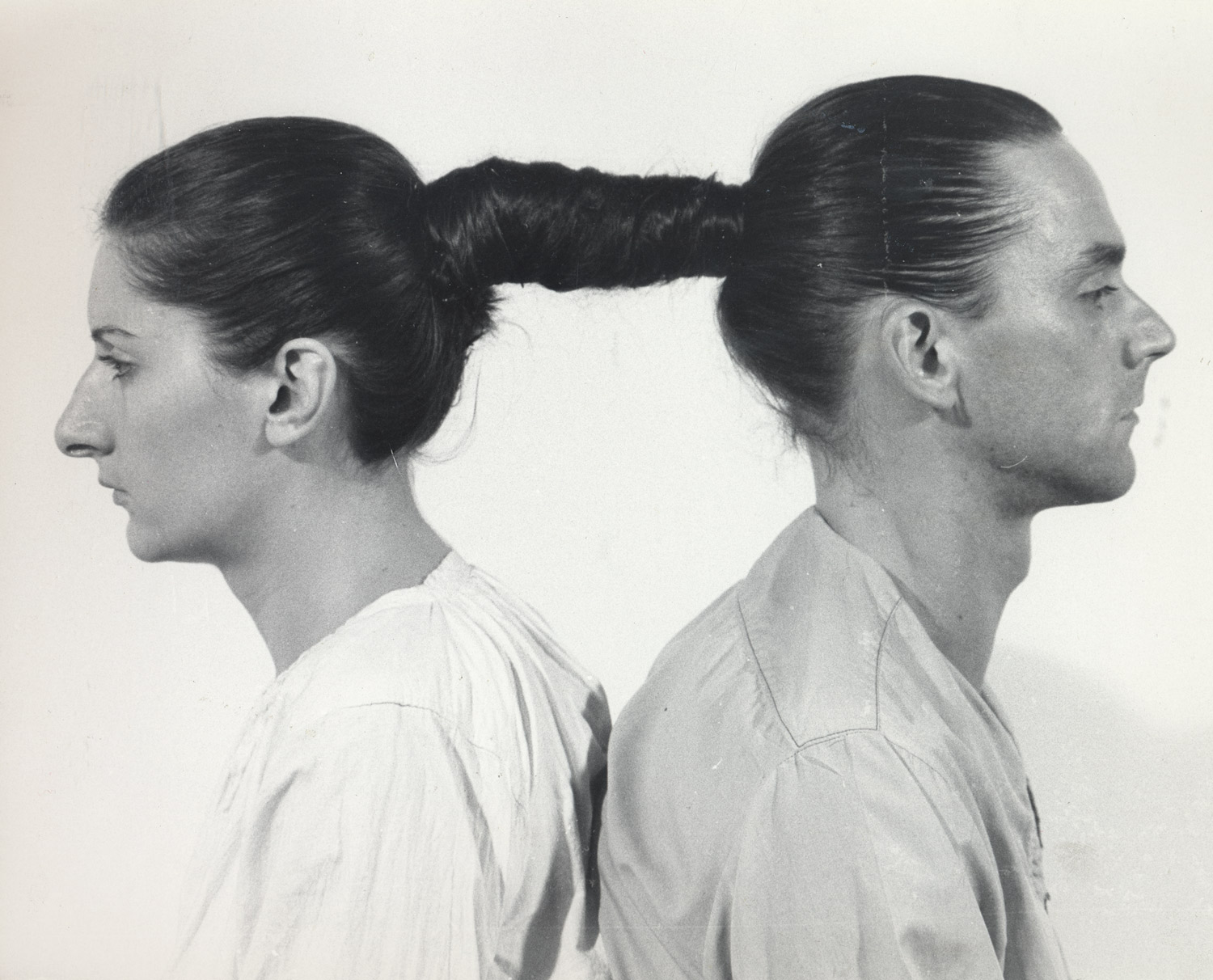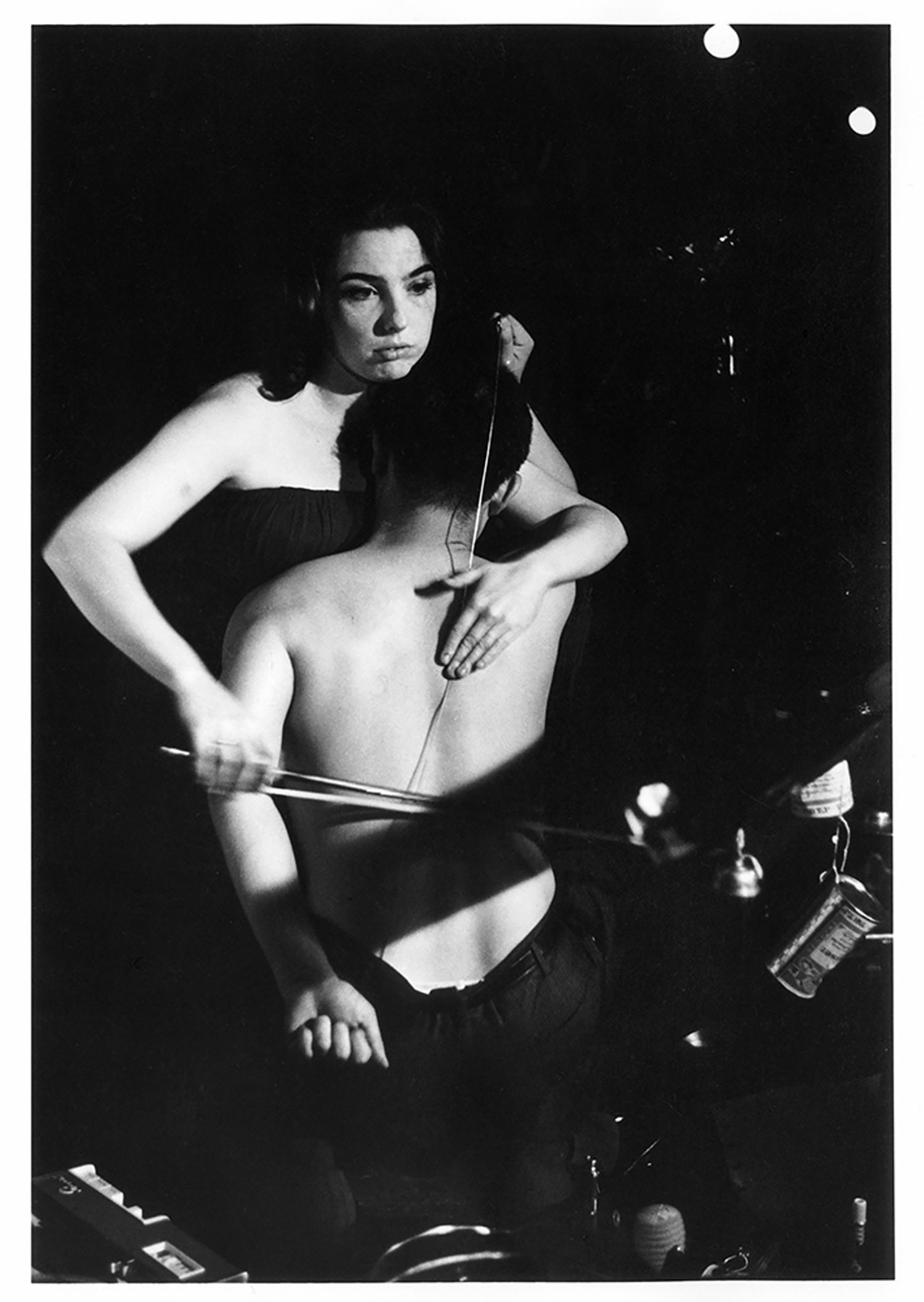
Giancarlo Politi: What does this Büro der Organisation für direkte Demokratie durch Volksabstimmung (Bureau for Direct Democracy), which you’ve installed here at Documenta 5 and where you speak to the public for eight hours a day, mean? Is it a political statement toward these “State Expositions,” or should we read it as a behavioral or Conceptual art to which Documenta 5 is partially dedicated?
Joseph Beuys: Well I think that the kind of art you see here is a kind of Conceptual art, yes? You see, I work mostly with ideas and information, but this information is related to very real, living questions of human life. They are not only related to the interests of a small minority, they are related to the needs of all people. There is a concept, and therefore I think that it is real Conceptual art.
GP: But what exactly does your work consist of, each day here in Kassel?
JB: My wish is to reach as many people as possible. I decided to come here because the situation in Düsseldorf is no longer effective at this particular time because everyone is on holiday and the city is empty. Therefore I decided to come here. I can reach people from all over the world, international people. Yesterday I met a delegation from East Germany, I couldn’t have met them had I been in Düsseldorf. This is an ideal place for meeting people at this moment. I also met a delegation from China, from Mao, and they wanted to invite me to meet the Chinese bosses. All these types of contacts can be made here now.
GP: People currently often talk about art and anti-art. Which ‘side’ are you on, where might we posit your work?
JB: These are two very important steps. It’s like a psychological tactic. First of all what I’m doing is anti-art because it has an inclination to destroy the old shape of art. The next step, for me, was to take these two together, anti-art and art, in a new form. The third step was the effect of having a very enlarged idea of art. Now I’m in the situation of clarifying and having a discussion between the whole of creativity.
Art is a formula. Everyone is an artist. To speak about the whole of creation: that is man. This is taking place at the present moment, the idea of science and the idea of art are being discussed. Now there is the analysis of the old, classical ideas of art and then of science and the outcome of its historical development. Then we enlarge this idea of art, and the next step is to enlarge the idea of science through discussion, to then have a new discussion. By discussing all the problems that mankind will have in the future it will be possible to have real sociology. A real sociology related to the human being cannot come from the established idea of science, especially for the next very important questions in the development of mankind.
GP: Right from its very beginning your work was very provocative, at least for the art world. It seems to me that your work maintains this aspect, and your participation in Documenta 5 is a demonstration of this. Who are you addressing in particular, your peers, the official world of culture, or the institutions?
JB: Yes sure, there are a lot of provocative things, but now the provocation is more against political parties, it’s more specialized. My first ‘provocation’ was pushing the whole existence of the people, not specifically the political parties. That’s the old attitude, and perhaps, my next. This is more interesting than ‘specialized’ art: pushing all existence to reach not only thinking, the intellectual position, but to reach feelings and the human will.
It is an anthropological discussion which naturally I’m interested in provoking.

GP: As we can see, for example, by the people around you and who want to speak with you, your way of provoking has the effect of a spectacle, it has mass appeal, while the general provocation which this Documenta is aiming at is more of a mental and conceptual provocation. Which do you think works better?
JB: The whole of Documenta is a type of provocation. All new ways of production are provocation, and naturally this is a good thing. Only the provocation delivers phenomena in their right position. I’m not very interested in the rules for other kinds of activities or methods of approach different from my own — creativity — but perhaps it’s very important that we have not only my own way of provocation. I will not rule other kinds of production, or imagination, and all these things. I’m not very interested in being a ruler in these things.
GP: Some people have spoken of you, I’m not sure how fittingly, in comparison to Duchamp — perhaps referring to your past work with Fluxus, your fields of interest, or some of your statements. Why is this, in your opinion?
JB: I have nothing to do with Duchamp, huh! If other people are interested in making me a hero then that’s their affair, but I’ve never entertained these ideas. I’m more interested in normal people, I’m not so interested in art.
GP: In your Bureau for Direct Democracy here at Documenta 5 you have a banner that says “La Rivoluzione siamo noi” (We are the Revolution). What do you mean exactly by this?
JB: I would say to the people that they could realize the revolution if they use the power that they have, but they have no consciousness of their own power and therefore we have no revolutions. Once more the people have the power to change the situation, but they don’t know they have the power.
GP: Do you think that Marx would have agreed with your point of view and that Marxism can help in realizing your proposals, which are so very individual?
JB: No. I think that Marxism is a very good starting point but I find more and more that the genius of Marx was to analyze the situation. He was unable to give concise advice to the people to make the revolution. His analysis was very general and we need this science of Marx, but we have to see that the position to make a revolution is not in Marx’s work. We find briefly some intention in this position of freedom in the younger Marx; there the idea of freedom had some position. But more and more he came to the revolutionary concept of making new structures in economics, new information, economics as revolutionary power. Therefore, for me, it seems very false. Marx did not cultivate the idea of freedom, he cultivated the idea of democracy and socialism, but he forgot to speak about freedom as a revolutionary power and that was false.
I find more and more that I’m not alone in this position, because freedom, creativity, is the only revolutionary power. This is my model of freedom as a revolution.
GP: In Paris, in May 1968, many students cried out for an art and culture outside of the official framework, for it to leave the museums and institutions and be brought out into the streets…
JB: Yes, that is why I do my art in the streets, but now because I cannot do anything in the streets I have come here to Documenta. My presence here is much more effective. Normally I work in the street, but not only in the street. We have houses, institutions, and we have to work in the places where we are. For instance, I am a teacher in an institution. It’s a very old institution and I’m trying to change this very old institution into a new institution but I think to do it I have to work in the street with art and speak to the people about the possibility of art, science and creativity, and therefore the self-destination of the people. To realize the possibility of self-destination coming out from their own possibility of creativity on all levels. We don’t have to wait for the point when creativity is on a very high level. Creativity can begin on a very low level. Everyone can work with the level they have at that particular moment. And when all people work together with the levels they have, then I think all people are able to be creative, not only artists. Workers are able, yes, housewives are able, too. I think most people are intelligent, perhaps too intelligent. Therefore I say “Der Mensch is das Kreative Wesen” (Man is the Creative Being). I think people are only interested in intelligence and not in the powers that they have for feeling, for feeling with other people together. That’s another way of creativity, to develop feeling. Another point is to develop the will, the uprising will in the people and all these abilities you find everywhere. You don’t find ability or capacity in a museum or in a street or in a special show. I can only say I work in the street, too.

GP: What is the next step in your work?
JB: I have a special aim: to establish a new international free school for creativity and interdisciplinary research. And the model for me is to have the educational level at all times equal with the presentational level. What we could do is discuss and work on all pedagogical problems on the school level in contact with the presentational level of creative productions of all kinds, internationally and permanently. So we could deal with the school problems, education problems, and permanently show, for instance, the creativity of the Chinese people and then the creativity of the Hungarian people, and Scandinavian people, English people, French people, then German people, special groups from Germany, Italy. During the permanence we would have an equality in all things because every group can present their kind of production. My idea is on these two levels, the education and the school problems and then the international presentation of all kinds of production, to make it visible.
GP: If art is life then you no longer need producers, then an art by artists is dead or dying.
JB: Yes we need production as a special end of creativity, you see. The point of creativity begins in life as thinking, yes? That’s the first production, thinking. The next production is language; you have to express your ideas from thinking. That’s the second stage of production, speaking, and perhaps writing. That’s a production people can look for and that’s what we need. We have to make a visualization of the production and perhaps more; we have to make it tactile from time to time. For instance, the outcome of creativity has been better machines for society, better means of traffic, for instance. We need all these realities in objects, not only in art, in technology. Therefore I’m interested in speaking not only in the abstract about this creativity but as life in general. But I think there is a difference between the beginning of the creativity and the products that are the products of all times: art, science. We have to show people the production, that is my meaning, so that all people can consider and control.
Art is important to destroy the old features; mankind is suffering with these old features of society. Therefore the duty of art is to destroy the old features by making new forms for society, new objects.
GP: But this is a new form within an old society.
JB: Yes, surely, and therefore I have my political bureau, because the objects are no longer able to change society. The bureau is an object too, and it is necessary to work with these objects to change the old features of society. Like you say, the features of art at the moment are not capable of changing.

